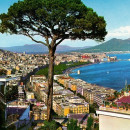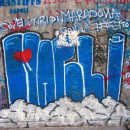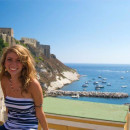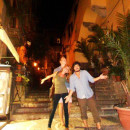A chaotic and beautiful city: Naples, Italy Past Review
By Christina S (Biology, General., Trinity University) for
Study Abroad Programs in Italy
I gained an expanded worldview from studying abroad that doesn't place the United States at the top of the totem, and determined that I love European and city lifestyle. I found that when you're thrown into a different country, you have to learn to understand and like yourself very quickly, in order to be successful. I learned that people who think they're depressed often just need coffee. And that I have a problem with authority and rules that I need to work on. But often, some rules just aren't supposed to be followed exactly, like crossing the street when the sign says. You're an intelligent adult; you can gauge when it is safe to cross or not, and so you should when you see the window to. My academic interests changed and I am finding it difficult to dedicate myself to Biology again. Talking to college students while abroad who chose a career first, then chose an academic concentration that matched it, I wish I would've done the same.
Review Photos




Personal Information
| How much international exposure did you have prior to this program? | 2 weeks - 1 month |
Review Your Program
|
* Overall educational experience
Academic rigor, intensity, resources, etc. |
This is a highly academic program with a challenging workload. The grading system, based on individual progress, comprehension, and participation, is evaluated by the professor throughout the semester. An oral final exam solidifies or changes (in the case of exceptional performance) the grade that the professor is thinking of giving you. A term paper is assigned in some classes with an open prompt, while daily workbook assignments comprise the courseload of other classes. Class attendance is required without question, something different from the normal Italian system and many of my classes at my University. Teaching methods were similar to my home University as the result of educated and highly motivated professors, but I found that they do not "teach to a test" as much as the American system does. |
|
* Host Country Program Administration
On-site administration of your program |
Weaknesses: The program size was extremely small and resulted in a micromanaged administration style that was too personally involved (when compared to American higher education). I learned that this also had to do with the Italian education system. The program lacked professionalism and leadership. Strengths: My expectations were met as a result of the city of Naples being so amazing and the caliber of the academics. |
|
* Housing:
How satisfied were you with your living arrangements? |
The housing was arranged for me. My apartment was beautiful, with 2 bedrooms, a living room, 2 balconies, a large kitchen/dining room, and a laundry balcony/courtyard. The view was incredible, overlooking the Piazza Plebicito, the sea, and Vesuvius in the distance. The neighborhood was nice, with everything I needed within walking distance-- a flower shop and bakery downstairs-- small side streets where fresh fruit, bread, meat, and other groceries each had their own store-- the large Via Toledo where you could do all the shopping you wanted-- and Via Chaia with all of the posh stores you wish you could afford (Dolce and Gabbana, Hermes, Salvatore Ferragamo). Classes were 20 minutes away but a bus ride cut the time in half, and nightlife was a funicolare-ride away. I didn't need to buy anything to get settled-in and my roommate, an Italian student, treated me like a dear friend, helped me transition, and introduced me to many other students. We still stay in touch and my experience wouldn't have been the same without her. |
| * Food: |
Meals were often an awesome social gathering with wine, too much delicious food to handle, and lots of yelling. For breakfast, I grabbed an espresso and breakfast pastry to-go at a coffee shop outside of the university. I had lunch with the other American students often, grabbing a 2 euro pizza, folding it in half and eating while walking, or we would make food at their apartment. |
|
* Social & Cultural Integration:
How integrated did you feel with the local culture? |
The field trips to Cumae, Pompeii, Rome, and Matera were incredible and very educational with informed guides. The first dinner arranged by the program was something I'll always remember. And the weekly social and art events that the program informed us of kept us up-to-date on fun things for young people. |
|
* Health Care:
How well were health issues addressed during the program? |
|
| * Safety: |
I got sick once while I was abroad and my program was very nice and offered to take care of me, but healthcare wasn't needed. I rated Naples overall safety as 5 stars because I feel it receives an inaccurate reputation for being highly dangerous, which keeps students from studying abroad there. Every city is dangerous if you put yourself in dangerous situations. Naples felt less dangerous than New York and definitely more safe than Rome. This idea summarizes it: In Napoli, if someone is robbing you, you can give them your cash and tell them you want to keep your purse, and they will not have a problem with it. In other cities in Italy, you are much more likely to be seriously injured or the victim of a malicious act. That being said, during my stay in Naples, my apartment was broken into while I was at the University. Nothing was stolen and we were never able to discover why someone was interested and took the time to break in, but we moved apartments shortly after, just to be safe. |
| If you could do it all over again would you choose the same program? |
Yes
|
Finances
|
* Money: How easily were you able to live on a student's budget?
(1 = not very easy/$200+ on food & personal expenses/week, 2.5 = $100/week, 5 = very easily/minimal cost) |
|
| Not including program expenses, about how much money did you spend on food and other expenses each week? | I spent $150 on average, I believe the majority on food. |
| Do you have any general money-saving tips for future study abroad participants? | Cook at home to save money and document the amount you're withdrawing and spending. If you arrive in the fall, buy clothes while the sales are still going on. |
Language
| * Did your program have a foreign language component? | Yes |
| How would you rate your language skills at the beginning of the program? | None |
| Language acquisition improvement? |
I went into this program knowing absolutely no Italian. Practice Italian everyday and don't be afraid to make mistakes. Begin by talking about yourself often and conjugating the verbs that you acquire in first person present tense. This helps you get used to conjugating. Learn verbs first! You need them. Then, branch out and make sure to use other conjugations in present tense (3rd person singular, 1st and 2nd person plural, etc.). Start to throw in some other tenses when you learn them, but if you can't remember the correct tense, say it in the easy present that you know. You can practice language with anyone, and need to a lot of the time, although most people at the school spoke English. |
| If applicable, to what degree did your living situation aid your language acquisition? |
|
Other Program Information
|
* Where did you live?
Select all that apply |
|
|
* Who did you live with?
Select all that apply |
|
|
* Who did you take classes with?
Select all that apply |
|
A Look Back
| * What did you like most about the program? |
|
| * What could be improved? |
|
Individual Course Reviews
| Course Name/Rating: |
Archaeology in Campania |
| Course Department: | |
| Instructor: | |
| Instruction Language: | English |
| Comments: | This course was very challenging, utilizing class involvement and field trips. Although it was overwhelming and seemingly disorganized at first, I left it with a breadth of knowledge that could not have ever been learned in one class at my home University. You learn so much about early Roman, Greek, Oscan, Etruscan, and other civilizations and are given the tools to "think like an archaeologist" in order to recognize and classify artifacts, art, burial customs, and architecture. |
| Credit Transfer Issues: |
| Course Name/Rating: |
Greek Literature |
| Course Department: | |
| Instructor: | Dr. Palmisciano |
| Instruction Language: | English |
| Comments: | This course was very interesting and provided a thorough understanding of the ancient Greek mind through analysis of Greek literature. It is well planned and executed. It is lecture and reading based, with required assignments read in class, but you'll find yourself immersed in the optional readings in your free time. It goes along with the Archaeology course very well, with pieces from each course coming together about halfway through the semester, and also provides insight into understanding Italy by focusing on its beginnings. |
| Credit Transfer Issues: | I am still waiting for my credit to transfer. |








